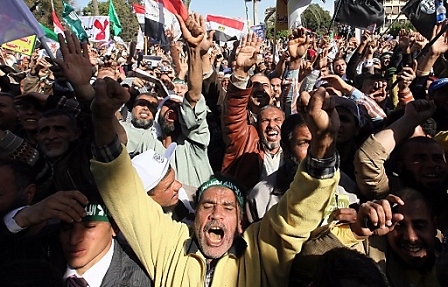Erstellt am: 22. 2. 2013 - 16:24 Uhr
Egypt's long road to a new government
Subscribe to the Reality Check podcast and get the whole programme after the show.
Egypt is to hold parliamentary elections starting in April. The announcement has been expected for months, it was just uncertain exactly when it would come.
One of the most noticeable details about the Egyptian election is how long the process goes on. With modern technology we are now used to elections that are held in one day, and we know the result a few hours after the polls close. In Egypt, the process goes on for two months, and is held separately in each of four regions. The reason for this is a shortage of election staff - or more specifically judges. Under the electoral law, judges have to oversee the voting at the polling station - and there just aren't enough judges to go round. Then there are first rounds and run offs - and the whole process takes time.

EPA
No less complicated than the electoral system is the choice facing the voters. While President Morsi enjoyed nearly 80% approval rating a few months after taking office, it's now somewhere around 55%. However, while the President and his Muslim Brotherhood party might be losing support, with the lack of any consolidated opposition, it's hard to see how he will lose.
According to our Cairo correspondent, Karim El Gawhary, the biggest problem is that politicians on all sides are failing to address the issues that people really care about. While the political elite argue about how Islamic or secular the government should be, what's worrying the people is the economy. The poorest families are getting poorer by the day, with over 25% of the population living below the poverty line - and that figure rising to a mind boggling 70% in rural areas.
Not surprisingly, ordinary Egyptians are not impressed by political ideals - they need jobs, money and food on the table - and they need it now. Politicians who are talking about anything else, are missing the point.
Dieses Element ist nicht mehr verfügbar
The Pope's resignation and allegations of gay Vatican officials
A leading Italian newspaper is linking the resignation of Pope Benedict XVI to the discovery of a network of gay officials in the Vatican. David Willey reports from Rome on the allegations and their importance.
Dieses Element ist nicht mehr verfügbar
Cholera in Haiti
The United Nations is rejecting claims that it is responsible for a cholera outbreak in Haiti that has killed 8.000 people. Riem Higazi talks to Dominik Zaum is the author of "UN Security Council and War" and Reader in International Relations at Reading University, about the report.
Dieses Element ist nicht mehr verfügbar
Amazon employees scandal
Paul Clarke of the GMB Union discusses the allegations of mistreatment of employees at Amazon.com.
Dieses Element ist nicht mehr verfügbar
Controlling Romania's feral horse population
As FM4's resident voluntary equine specialist, it's a bit embarrassing to admit that I knew nothing about Romania's feral horses. That all changed yesterday when, following on from last Saturday's Reality Check Special on wild horses, I was invited to the offices of the Vier Pfoten to meet Robert Hengl, the Head of Competence Centre Horses, to discuss their birth control programme for one of Romania's feral herds.
In fact, Romania's feral horses have some distinguished ancestors. They date back hundreds of years to the war horses who escaped from the Tartars. In more recent times, following the end of communism, they were joined by farm horses who were no longer needed on the collective farms, and were turned loose because no one could afford to keep them. Unlike some domestic animals, horses are generally very self-sufficient, and left to their own devices survive very nicely in a feral state.
For decades these horses have roamed the countryside with no official owners. Sometimes they were captured and sold for meat by impoverished farmers, unable to make a living in the post-communist economy. Mostly, however, they went about their business as horses do, and their numbers increased.
This is all well and good for the horses, but may not be so good for the Letea Forest nature reserve, where about a thousand of them are living. There, they are getting the blame for eating rare plants and trees, and the Romanian government wants to get rid of them.
This is where the Vier Pfoten come in. It's not the first time they have stepped in to help the horses in this region. In 2011 they saved dozens from illegal transport for slaughter.
Now, with an ambitious plan to round up the horses, tag them and administer contraceptive injections, they hope to control the numbers, so that the horses, the local people and the government will all be happy, and the area can concentrate on remaining one of eastern Europe's finest beauty spots.
Dieses Element ist nicht mehr verfügbar
FM4 Reality Check
Monday to Friday from 12.00 to 14.00, and after the show via Podcast or fm4.orf.at/realitycheck.


